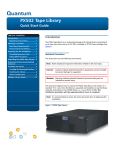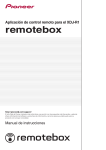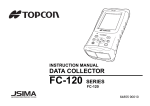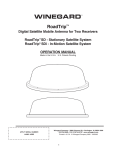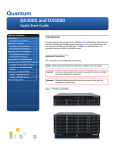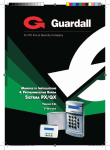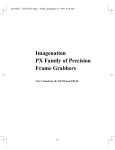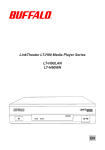Download Quantum Audio PX502 Network Card User Manual
Transcript
PX502 Tape Library Quick Start Guide TABLE OF CONTENTS Introduction .......................................1 Notational Conventions .................1 Choosing a Location ..........................2 Rack Space Requirements...............2 Introduction 0 The PX502 tape library is an automated storage and retrieval device consisting of up to two tape drives and up to 32 SDLT cartridges or 38 LTO tape cartridges (see figure 1). Environmental Conditions .............2 Preparing for the Installation ...........2 Providing Necessary Tools ..............2 Taking ESD Precautions ..................2 Unpacking the PX502 Tape Library ...2 Installing the Library .........................3 Locating the Mounting Position ....3 Notational Conventions 0 This instruction uses the following conventions: NOTE: Notes emphasize important information related to the main topic. Installing the Library ......................4 Initial Configuration .....................11 Multiple Library Stacks....................15 CAUTION: Cautions indicate potential hazards to equipment and are included to prevent damage to equipment. WARNING: Warnings indicate potential hazards to personal safety and are included to prevent injury. This document explains how to unpack the PX502 tape library and install it in a standard 19 in. rack. Once the library is unpacked and installed, set up the library using the instructions in the PX500 Series User’s Guide PN 81-81290. This installation procedure will take approximately 4 hours to complete. NOTE: It is recommended to review the entire document prior to beginning the installation. Figure 1 PX502 Tape Library PX502 Tape Library Quick Start Guide Choosing a Location 0 Rack Space Requirements • Environmental Conditions Rack Space Requirements 0 Provide the following tools for unpacking and installing the PX502 tape library: When choosing an installation site for the PX502, consider the following requirements: • Providing Necessary Tools 0 • #1 PHILLIPS® screwdriver • #2 PHILLIPS screwdriver • #1 flat blade screwdriver • Allen wrench (2.5mm and 3mm) included in accessory kit • Antistatic wrist strap included in accessory kit Table 1 contains the rack requirements for the PX502 tape library. Taking ESD Precautions Table 1 Rack Requirements Dimensions PX502 Depth 31 in (78.7 cm) Width 19 in (48.3 cm) Height 6.75 in (17 cm), 4U Weight 52 lbs (23.6 kg) Air Clearance Open 4 in (10 cm) behind unit for proper air flow Environmental Conditions Some components within the PX502 tape library contain static-sensitive parts. To avoid damaging these parts while performing installation procedures, always observe the following precautions: • Humidity: 20%-80% non-condensing • Temperature: 10°C-35°C (50°F-95°F) • Altitude: -500 to 10,000 feet (-152 to 3048 meters) These environmental conditions apply when the PX502 tape library is in operation. NOTE: For additional specifications, refer to the Quantum PX500 Series User’s Guide (PN 8181290) Preparing for the Installation Before you begin the installation procedure in this section, make the following preparations as described in this section: Providing Necessary Tools • Taking ESD Precautions • Keep the PX502 turned off during all installation procedures. • Use an antistatic wrist strap (included in the accessory kit). • Keep static-sensitive parts in their original shipping containers until ready for installation. Look for the ESD sticker to identify static sensitive parts. • Avoid touching connectors and other components. 0 The installation site must have the following environmental conditions: • 0 NOTE: Dry climates and cold-weather heating environments have lower relative humidity and are more likely to produce static electricity. Unpacking the PX502 Tape Library 0 This section explains how to unpack the PX502 tape library and move it to its final installation location. 0 NOTE: Inspect the outer library packaging for damage. If there is any damage evident on the library packaging, do not continue with the installation and contact Quantum customer support. 2 PX502 Tape Library Quick Start Guide 4 Remove the antistatic sheet: By following these instructions, you help ensure that the system will continue to be safeguarded after it arrives at the installation site. a Cut the tape strips securing the sheet. b Fold the sheet down. NOTE: Unpack the library as close to the installation location as possible. c With the help of a second person, lift the library up off of the antistatic sheet. d Place the library on the table or desk next to the antistatic sheet. Unpack and remove the following components from the packing materials (see figure 2): e If this is a multiple library stack, refer to “Multiple Library Stacks” on page 15 before proceeding. 1 Remove the accessories kit and set it aside. The PX502 is ready to install. WARNING: At least two people are required to move the library chassis. CAUTION: Lift the library chassis at the sides. Avoid putting the weight of the library chassis on the front bezel. Installing the Library 0 Installing a PX502 tape library in a rack consists of the following steps: 2 With the help of a second person, lift the library chassis up and out of the shipping carton. • Locating the Mounting Position • Installing the Library 3 Place the library on a table approximately waist high. • Initial Configuration Figure 2 Unpacking the PX502 Accessory kit Locating the Mounting Position 0 The PX502 tape library is designed to fit in a standard 19 inch wide rack. It is important to the library installation to locate the hole pattern in the rack rails (see figure 3). The library must be installed at the beginning of the hole pattern. Refer to table 2 for information on common rack hole types. Foam PX502 tape library Lift point Front bezel Foam 3 PX502 Tape Library Quick Start Guide Figure Description Cage nut Square rack holes are the most common type of rack holes. They can accept either cage nuts which mount from the back of the rail or clip nuts which clip on from the side of the rack rail. Figure 3 Rail Hole Pattern Front panel screws mounting positions 1 PX502 System (4U) Table 2 Rack Hole Types 4U Back panel screws mounting positions Front panel screws mounting positions 1U = 1.75 in (44.45mm) Clip nut Clip nut The marks above (X) indicate the location of mounting hardware on the rack rails. Ensure that any necessary mounting hardware is installed on the rack rails prior to installing the chassis. Through holes require clip nuts to accept mounting hardware. Threaded holes require neither cage or clip nuts to accept mounting hardware. Hole pattern Top of rack .312 in (7.92 mm) .625 in (15.9 mm) .625 in (15.9 mm) .5 in (12.7 mm) .625 in (15.9 mm) .625 in (15.9 mm) .5 in (12.7 mm) WARNING: If the rack is empty at the time of installation, do NOT install the PX502 tape library too high in the rack. The weight of the library may cause the rack to become “top heavy” and unstable if installed in the top of an empty rack. Begin installing the PX502 tape library from the bottom of the rack if more than one library is installed. NOTE: The rails within the rack have a hole pattern that repeats throughout the rail. X marks the screw positions. Install nut clips (included in the accessory kit) on the rails if necessary. Installing the Library 0 Installing the PX502 tape library consists of the following steps: NOTE: If this is an upgrade to an existing library system, see “Multiple Library Stacks” on page 15. • Installing the Rack Mount Shelves • Installing the Library Chassis • Cabling the Library 4 PX502 Tape Library Quick Start Guide Table 3 Library Mounting Hardware Qty Figure 16 • Allen head screws (M5 x 10) for shelf assembly Type of rack mount rails (square hole, through hole, or threaded hole) • Depth of rack (34 in, 86.3 cm minimum depth recommended; however, rack depths of 24 in, 60.9 cm to 36 in, 91.4 cm are supported) T- nuts (M5) PN 74-87575-01 4 metric and 4 standard 0 Before installing the rack mount shelves, you must collect the following information: Description PN 90-87203-01 8 Installing the Rack Mount Shelves Rail adapters (both metric and standard holes are included, 8 total adapters, see figure 6) 1 Assemble the rack mount shelves (left and right): a Determine the mounting hole locations. The holes used to attach the two halves of the rack mount shelves differ depending on the depth of the rack (see figure 4). PN 74-88052-01 (metric) PN 74-88053-01 (standard) 2 d ten Ex PN 74-88055-01 (shelf) Sh 4 sets Right and left support shelves (left shown) er elf PN 74-88056-01 (extender) Front and back rail mounting hardware (M4 x 12 allen screws and mounting plates) PN 74-88054-01 (plate) PN 90-87203-03 (screws) 2 sets Back bracket hardware (M5 x 8 allen screws and mounting plate) PN 74-88057-01 (bracket) PN 90-87275-01 (screws) 2 sets Back clamp hardware (M5 x 10 and back clamp) PN 90-87343-08 (screws) PN 74-88058-01 (clamp) 5 PX502 Tape Library Quick Start Guide Figure 4 Rack Mount Shelf Depth Requirements Figure 5 Assembling the Left and Right Rack Mount Shelves Left shelf oriented with FlexLink™ opening toward front of rack Front of rack r de ten x E Use these holes for rack depths of 27 in (68.5 cm) to 36 in (91.4 cm) d an ft-h e L Front of rack Use these holes for rack depths of 24 in (60.9 cm) to 28 in (71.1 cm) Right shelf oriented with FlexLink opening toward back of rack elf sh t n ou km c ra Front of rack Use these holes for rack depths of 24 in (60.9 cm) to 28 in (71.1 cm) M5 x 10 Allen screws T-nuts must be oriented as shown to properly fit in the shelf adjustment slot Back of rack Back of rack T-nuts must be oriented as shown to properly fit in the shelf adjustment slot Back of rack Back of rack The metal fold must be toward the outside of the self as shown T-nuts b Loosely attach the adjustable rack mount shelves (extenders and shelves) with 4 M5 x 10 Allen screws and T-nuts (see figure 7). T-nuts Ex ten d Rig M5 x 10 Allen screws ht- er ha nd rac km ou nt sh elf Front of rack Use these holes for rack depths of 27 in (68.5 cm) to 36 in (91.4 cm) The metal fold must be toward the outside of the self as shown c Determine the type of rail adapter required for your rack. Each rail adapter is marked with the specific hole type supported, either metric or standard (see figure 6). 6 PX502 Tape Library Quick Start Guide Figure 6 Rail Adapter Types Figure 7 Assembling the LeftHand Rack Mount Shelf Rail adapter Arrow must point up M5 x 10 Allen screws elf sh t f Le Use the rail adapters with blocks on rails with square hole patterns Rail adapter M5 x 10 Allen screws Arrow must point up Rail adapters Rig h ts he lf M5 x 10 Allen screws Use the rail adapters with circle pegs (opposite blocks) on rails with non-threaded circle hole patterns FlexLink opening located towards the back for the righthand shelf M5 x 10 Allen screws 2 Install the left and right rack mount shelves into the rack (the rack mount shelves adjust 27 in. to 36 in.) and secure with the following parts in four locations (see figure 8): • Mounting plate • 2 M4 x 12 Allen screw. NOTE: The rack mount shelves must be installed on the inside rack rails. Use the rail adapters with small circle pegs on rails with threaded circle hole patterns (M6 on one side and M5 on the other side) d Attach the appropriate rail adapter to the front and back of the rack mount shelves (right and left) with 2 M5 x 10 Allen screws per adapter (see figure 7). 7 PX502 Tape Library Quick Start Guide Figure 8 Installing the Rack Mount Shelves Figure 9 Tightening the Rack Mount Shelves Mounting plate M4 x 12 Allen screws Tighten screws to secure both rack mounting rails Left shelf Right shelf 3 Once the rack mount shelves are secured to the rack, tighten the Allen screws securing the adjustable shelves (right and left) together (see figure 9). Installing the Library Chassis 0 WARNING: The PX502 tape library weighs approximately 52 lbs (23.6 kg). At least two people are required to lift and install the library. 1 The back mounting brackets are lettered (A through I) so the correct mounting position is easily determined. The mounting positions differ depending on the depth of the rack (see table 4). NOTE: If the depth of the rack is less than 27 in, do not install the back mounting brackets or clamps. 8 PX502 Tape Library Quick Start Guide Figure 10 Installing the Back Mounting Brackets Table 4 Back Mounting Bracket Orientation Back mounting bracket Back mounting bracket #1 Holes #2 Holes M5 x 8 Allen screws Back mounting clamp Rack Depth Back Mounting Bracket (Mounting Position) Back Mounting Clamp #1 Holes #2 Holes 24 to 25 in. Back bracket and clamp not required N/A N/A 25 to 26 in. Back bracket and clamp not required N/A N/A 26 to 27 in. Back bracket and clamp not required N/A N/A 27 to 28 in. Use holes A and C X 28 to 29 in. Use holes B and D X 29 to 30 in. Use holes C and E X 30 to 31 in. Use holes D and F X 31 to 32 in. Use holes E and G X 32 to 33 in. Use holes F and H X 33 to 34 in. Use holes G and I X 34.5 to 35.5 in. Use holes F and H X 35.5 to 36.5 in. Use holes G and I X Right-hand back bracket shown. NOTE: If this is a multiple stack configuration, refer to “Multiple Library Stacks” on page 15 for information on preparing the library chassis for passing tape cartridges from one unit to another. 2 Install the library into the rack as shown in figure 11 and secure the library to the rack with four PHILLIPS screws. WARNING: The PX502 tape library weighs approximately 52 lbs (23.6 kg). At least two people are required to lift and install the library. Figure 11 Installing the PX502 in the Rack Once the location is determined, attach the back brackets to each side of the library with four M5 x 8 Allen screws (see figure 10). NOTE: If your rack has a depth less than 27 in., the back brackets and back clamps are not used. PHILLIPS screws 9 PX502 Tape Library Quick Start Guide 3 Secure the back of the library to the rack with two mounting clamps (refer to table 4 for information on the correct mounting holes to use) and two M5 x 10 Allen screws on each clamp (see figure 12). Figure 13 Removing the Tape Drive Cover Plates Tape drive bay 1 NOTE: If the depth of the rack is less than 27 in, do not install the back mounting brackets or clamps. 4 Secure the mounting clamps to the rack rails with two PHILLIPS screws on each side (see figure 12). Figure 12 Securing the Back of the Library Back mounting clamp Tape drive bay 2 Cover plate b Insert the tape drive(s) into the drive bay(s) slowly until the connectors are seated. Refer to figure 14 for drive bay numbering (see the Quantum PX500 Series Tape Drive Installation Instructions PN 81-81301 for information). Figure 14 Installing the Tape Drives PHILLIPS screws M5 x 10 Allen screws Left-hand back bracket shown. 5 To install the tape drives into the library: a Remove the tape drive cover plates (if necessary, some libraries ship with one tape drive installed) by loosening the captive screws securing the plate to the library chassis (see figure 13). Back of Library Tape drive 2 Tape drive 1 c Tighten the tape drive thumbscrews using a flat blade screwdriver. d Repeat these steps to install another tape drive in a different location, if desired. The library chassis is installed in the rack. Cabling the Library 0 1 Connect the SCSI cables and jumpers as shown in the following figures: • Figure 15 SCSI System Controller Board • Figure 16 Surrogate SCSI System Controller Board 10 PX502 Tape Library Quick Start Guide Figure 17 Native Fibre Channel System Controller Board • NOTE: Quantum ships sufficient SCSI cables and terminators with the libraries to set up two-drives per SCSI bus. One tape drive per SCSI bus may be necessary for optimum performance. Refer to your tape drive documentation. Figure 17 PX502 Cable Configuration (Native Fibre Channel) Ethernet Fibre Channel host/SAN Back of Library Tape drive 2 Tape drive 1 NOTE: SCSI cable lengths should not exceed: • 39.37 feet (12 meters) between the host and the library for single drive per bus installations. LTO Tape drives shown. SDLT drives have a single FC port Figure 15 PX502 Cable Configuration (SCSI System Controller Board) Ethernet SCSI host Power Tape drive 1 Fibre Channel host/SAN 2 Connect one end of an AC power cable to each installed power supply and to a wall outlet. SCSI System Controller Board Tape drive 2 Fibre Channel host/SAN Initial Configuration 0 Initially configuring the library consists of the following steps: Power Back of Library Figure 16 PX502 Cable Configuration (Surrogate) Ethernet Surrogate System Controller Board SCSI host • Turning on the Library • Removing the Remaining Packing Materials • Setting the Library Options • Setting the Date and Time • Setting Network Information Turning on the Library 0 To turn on the library: Tape drive 2 Power Tape drive 1 Back of Library 1 Verify that: • Power cables are firmly in place • All doors are closed and latched 2 Turn on the library by pushing power button located on the bottom left-hand corner of the OCP (see figure 18). NOTE: When operating in surrogate mode, the SCSI host connection must be made to tape drive 1. 11 PX502 Tape Library Quick Start Guide Figure 18 Turning on the Library Figure 19 Removing the Top Cover (Optional Step) OCP Power button The power up sequence can take several minutes. The first message displaying will be “Are the internal packaging materials removed?” Continue with Removing the Remaining Packing Materials Removing the Remaining Packing Materials 0 Now that you have installed the library chassis and powered on the system, you MUST remove the remaining packing materials from the library chassis before the library is operational. 1 Put on an antistatic wrist strap and clip it to the library chassis. CAUTION: Take standard ESD precautions when performing this procedure. 2 IF there is space above the library to remove the top cover, remove the twelve PHILLIPS screws securing the top cover and FlexLink cover to gain further access to the internal packaging restraints (see figure 19). If there is no space above the PX502 library to remove the top cover, continue with Step 3. 3 When the library powers on for the first time, the OCP asks you: “Are the packaging materials removed?” (YES or NO). CAUTION: Pressing Yes when the internal packaging restraints are in place will damage the library robotics. 4 Press NO to continue. The OCP displays “Doors opened, magazines released, pull magazines out before power shutoff.” The library waits approximately 30 seconds for you to open the doors, remove both magazines from the library, and remove the foam blocks. NOTE: If you are unable to remove the magazines before the library shuts down. Turn on the library power and repeat the steps above. 12 PX502 Tape Library Quick Start Guide 5 After the library has powered down, remove the foam restraints by completing the following steps (see figure 20): Figure 20 Removing the Foam Restraints a Detach the tie band holding the two sides of the metal restraints together and remove it from the library. b Remove the metal restraints from the library. c Lift the left foam restraint slightly up and remove it from the library. d Slide the right foam restraint to the right until you are clear of the robotics motor and remove the restraint from the library. CAUTION: Avoid touching the printed circuit board. CAUTION: When removing the foam restraints, ensure that the robotics umbilical cable is lying down in the correct position inside the platform and not across the robotics track. Tie band Metal restraint Foam restraints Metal restraint Robotics umbilical cable NOTE: Save the robotics restraints and re-usable tie wrap for later shipping or relocation of the library. e Install the tape cartridge magazines. NOTE: Refer to the PX500 Series User’s Guide (PN 8181290) for more information on loading the tape cartridge magazines. f Close the front doors. g If you have removed the top cover for better access, install the top cover back on the library. 13 PX502 Tape Library Quick Start Guide Setting the Library Options 0 To set the library options: 1 Turn on the library by pushing power button located on the bottom left-hand corner of the OCP (see figure 18). 2 The OCP asks you: “Are the packaging materials removed?” (YES or NO). 3 Press YES to continue. Table 5 Setting Up the Cabinet Cabinet Options Description Host bus Sets the SCSI ID for both the library and tape drives. Stack role Assigns the library stack role as Master, Slave, or Stand alone (solo). There can be only one Master library in a multiple stack. Once configured as a slave, all library OCP functions can be controlled via the Master library OCP. The library model number will also change to PX500S indicating a stacked library configuration. The library model number is available from the home screen on the Master library OCP. Left load port Enables or disables the left load port Right load port Enables or disables the right load port Drive FUP from tape Allows you to perform a tape drive firmware update from a firmware update tape cartridge. 4 The OCP asks again: “Are you sure the packaging materials are removed?” (YES or NO). 5 Press YES to continue. The library continues the boot process. When complete, the Home screen displays. 6 Press Setup from the Home screen. The OCP displays the Setup screen (see figure 21): Figure 21 Setup Screen Enter 7 From the Setup screen, use the up and down arrows to highlight Cabinet and press Enter. The Cabinet Setup screen displays (see figure 22): Figure 22 Cabinet Setup Screen Setting the Date and Time 0 To set the date and time: 1 From the Setup screen, use the up and down arrows to highlight Date and Time and press Enter. The Date and Time screen displays (see figure 23): Figure 23 Date and Time Screen 8 The Cabinet Setup screen allows you to configure the following information about the library (see table 5): The Date and Time screen displays the following information about the library: 14 PX502 Tape Library Quick Start Guide 2 Use the up and down arrows to view or edit the time zone, date, and time information. Press Enter to accept the new settings. Multiple Library Stacks 3 When you are finished viewing/editing the date and time information, press Exit to return to the Setup screen. Setting Network Information NOTE: If the library is NOT being installed with other libraries to operate in a multiple library stack, it is not necessary to complete the following instructions. 0 To view or edit the network information: NOTE: If you are using DHCP, you do not have to setup the following network information. Once the library is on-line, it is ready to use. If the library will be installed in a rack with other PX500 Series libraries, you must prepare each chassis prior to installation. Preparing the library chassis for installation into a multiple library stack consists of: NOTE: It is recommended to place the Master library in the middle of the library stack for improved performance. NOTE: The library must be offline to change these settings. 1 From the Setup screen, use the up and down arrows to highlight Network and press Enter. The Network screen displays (see figure 24): Figure 24 Network Screen 0 • Removing the FlexLink cover plates • Installing the alignment hardware To prepare the library chassis for multiple stack operation: 1 Remove two PHILLIPS screws securing each FlexLink cover located on the top and bottom of the library using a #1 PHILLIPS screwdriver (see figure 25). NOTE: Remove the bottom FlexLink cover on every library except the bottom library in the stack. Remove the top FlexLink cover on the bottom library in the stack. The Network screen allows you to view or edit the following network settings: • DHCP (default setting) • IP address • Subnet mask • Default gateway 2 Use the up and down arrows to select the network setting you wish to view or edit and press Enter. When you are finished viewing/editing the network information, press Back, then Exit to return to the Setup screen. 3 For the network information such as the IP address to be active or take effect, you must power down the library by holding down the power button located on the front of the library after changing any of the network settings (see figure 18). The library shuts down. 4 Push the power button to start the library. The PX502 tape library is initially configured and ready for use. 15 PX502 Tape Library Quick Start Guide Figure 25 Removing the FlexLink Cover Remove only the top FlexLink cover on the bottom library in the stack Screws NOTE: Install only the bottom alignment hardware on the top library in the stack and the top alignment hardware on the bottom library in the stack. Figure 26 Installing the Alignment Hardware p To Screws Top alignment hardware FlexLink cover p To FlexLink cover tt Bo om Screws Remove only the bottom FlexLink cover on the top library in the stack 2 The alignment hardware installed on the top and bottom of the libraries in a multiple stack allow the FlexLink bays to align correctly when installed in a rack. Install the following alignment hardware (see figure 26): m tto Bo a Install the top alignment hardware with two Allen head screws. b Install the bottom alignment hardware with one Allen head screw. Bottom alignment hardware Screws The libraries are prepared for installation in a multiple stack. *81-81292-03 B01* 81-81292-03 B01 United States of America Quantum Corporation 141 Innovation Drive Irvine, CA 92612 U.S.A. phone 949.856.7800 fax 949.856.7799 European Headquarters Quantum Corporaton 3 Bracknell Beeches Old Bracknell Lane West Bracknell Berkshire RG12 7BW United Kingdom phone +44 1344 353500 fax +44 1344 353510 Asia Pacific Quantum Corporaton Level 3 200 Creek Street Brisbane, Qld 4000 Australia phone +61 7 3839 0950 fax +61 7 3839 0955 ©2007 Quantum Corporation. Quantum, the Quantum logo, and the DLTtape logo are all registered trademarks of Quantum Corporation. SDLT and Super DLTtape are trademarks of Quantum Corporation. Other trademarks may be mentioned herein which belong to other companies. 81-81292-03 B01 March 2007
















